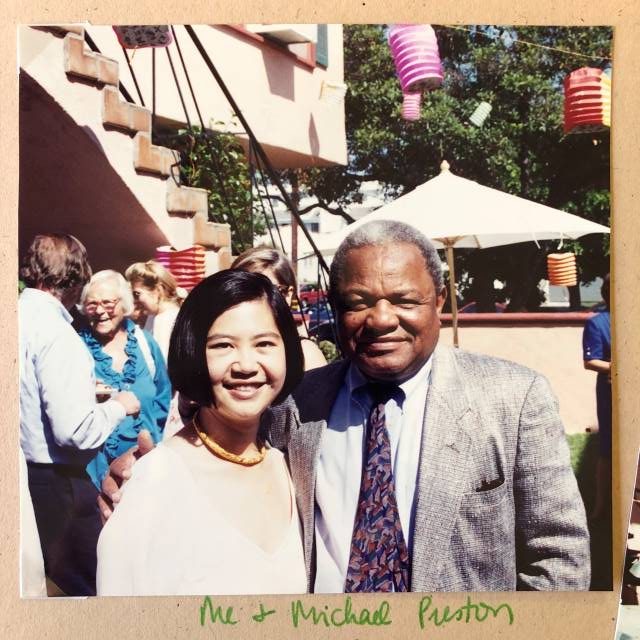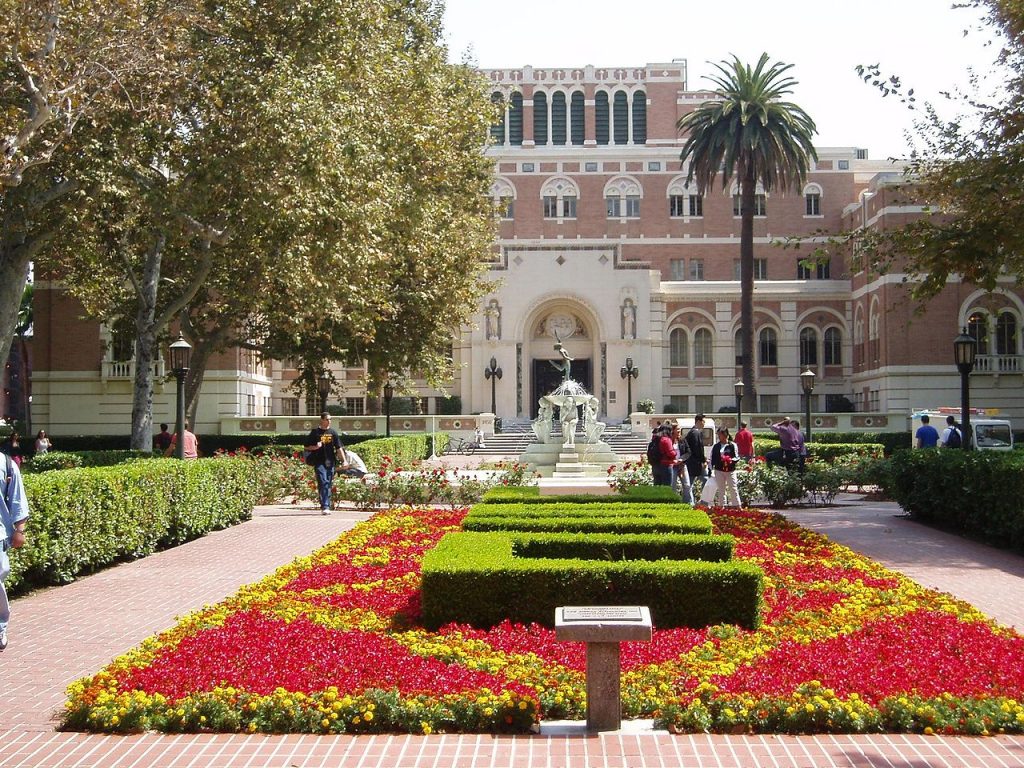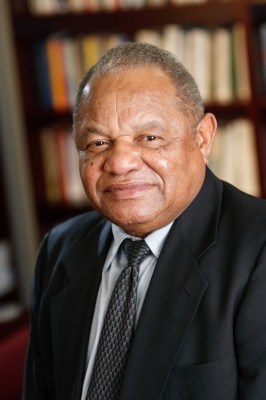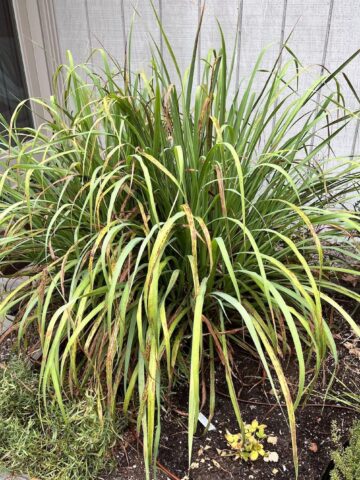
I was editing a cooking video for the blog and it seemed more like a slog. That's because like many other Americans right now, my mind was on other matters, particularly the racial tensions that we're experiencing. This morning, while meditating, the man in the above photo floated into my thoughts. His name is Michael B. Preston, and he mentored me in college and beyond.
Professor Preston was a political scientist at the University of Southern California. He passed away in 2014, at age 80, from pancreatic cancer, but he'd already left a deep imprint on my life. We came to know each other after I became his workstudy assistant in 1988. Several times a week, I reported to his windowless suite of offices, which he jokingly called "the ghetto", and quietly pored through a stack of books on urban politics, black politics, machine politics, and race relations. Occasionally I ran errands, but mostly I read the books then wrote abstracts for his review. (In academia, that's called doing a literature review.) Though I officially majored in business finance and minored in Chinese language and culture, I received extra coursework in civil rights.
He soon became chair of the political science department and we had to "move upstairs" as he said. I became his part-time secretary with a desk near a window. There was less reading of books and more mundane stuff like photocopying, typing up letters of recommendation, and taking phone calls.
Diversity All Around
In the department headquarters, he taught me the politics of work. Dr. Preston was one of the few black faculty members at USC, and he strategically built relationships that crossed color and power lines, with faculty, staff, and students. He regularly checked in with a network of prominent black political scientists across the nation. They worked to understand race relations in the world while managing race relations within their spheres of influence.
From his wearisome looks, pensive cigarette smoking, and "fair-to-middling" responses to perfunctory questions about how he was doing, I sensed that he shouldered a lot. He was an influential black scholar in a somewhat conservative, conventional institution in one of the most diverse parts of Los Angeles. He often felt "pressurized". Folks like Dr. Preston and his cohorts, all successful in their fields, assumed extra responsibility for shepherding the future of their communities.

However, Dr. Preston saw the humor and irony in what went on around him. Recounting a phone call to Maulana Ndabezitha Karenga, an Africana studies professor, potent activist, and creator of the Kwaanza holiday who was stirring the pot a lot, Dr. Preston said something along these lines: I called Karenga the other day and his mother picked up the phone. I respectfully asked for Maulana and she paused before responding, "Oh, you mean Ron?" (Karenga's birth name was Ron.)
The department office manager and other staff were also black Americans, so during my two years working for Dr. Preston, I became comfortable with a diverse workplace. I was their subordinate, and the ladies looked after me. I mastered professional office conduct while picking up some sass from Veronica Pete and Gerlonda "Jody" Battles (when Jody flashed her temper, haughty faculty members wilted).
Growing up, my family didn't interact with black people. There were few of them in the relatively white town of San Clemente where we lived. But in the political science department, black Americans defined much of my work life.
Keep It Real, Stay Focused
Years later, after I completed my master's degree, Dr. Preston offered me a gig at the Center for Multiethnic and Transnational Studies where he was serving as director. It was the mid 1990s, after the Rodney King Riots, and we talked openly about race. He also shared some of his personal story.
Dr. Preston grew up in Tyler, a city in eastern Texas, under Jim Crow Laws. There were many restrictions. For example, black people weren't allowed in the movie theaters until around 11pm. When you went, he said, you still had to sit in the upper reaches of the theater because you were black.
Later on, he saw footage of Hank Aaron playing baseball in California. In the stands were people of different races just being natural together and enjoying the ballgame. The free mingling of people from varying backgrounds partly seeded his move to California, he said.

He and his wife Mary relocated to Oakland where he taught junior high while attending graduate school at Berkeley. On the weekends, they'd drive to Los Angeles to check out favorite jazz clubs. "Along the way, we'd stop and pick cotton to make extra money," he told me.
All those experiences (and others) explain why he launched the first black politics class at USC, recruited minority and female scholars, groomed minority graduate students for success, and worked with minority student athletes. He welcomed and boosted people wherever he met them.
On the occasions when we he took me to lunch at the USC faculty dining hall, he'd scan the room, nod and smile, then conduct a little business with the powers that be.
"Keep your eyes on the prize," he'd say, referring to an influential folk song during the 1950s and 60s Civil Rights Movement.
Building Bridges Everywhere
One day he proclaimed to me in his charming southern drawl, "On-DRAY-ah, Asians need to figure out their intra-ethnic problems before we can deal with inter-ethnic issues." He and his colleagues had been examining spatial demographics to map population shifts and to understand race relations developing in Los Angeles. They had identified that Asians had issues with Asians.
That sounds like a no brainer but few people discussed race issues in that framework back then (or now). It seemed like airing the dirty laundry. If anything, you talked about it with another Asians.
Our conversation underscored that as humans, we're a big mess and that makes race relations a tangle of issues. You can't resolve them overnight. But you have to think about them, make an effort, and play the long game to build coalitions.
When I told him I was getting married, he took my white fiance and I out for a meal. He looked at us and said, "Marriages between people of different races can help to resolve racism in this country."
Despite all his experiences, Dr. Preston remained hopeful and always a bit romantic. He attended our wedding in 1996 and we took the photo at the top of this post.
I chatted and hung out with him a few times after the wedding and our move to Northern California. I miss Dr. Preston. His mentorship will last forever.
Related Links for More Perspectives
- The Long Reach of Racism (WSJ) by Orlando Patterson, a distinguished scholar at Harvard University, summarizes the history of inequities.
- Corporate America has Failed Black America (NYT) includes interviews with elite black executives.
- 3 Stories of Black-owned Businesses Damaged in the Riots (the Hustle) tells personal stories about small business owners looking to rebuild their enterprises.

















Amy N says
I totally love this. Thanks for sharing!
Andrea Nguyen says
Thank you, Amy!
Elizabeth Andoh says
Many thanks for sharing your story.
RBC says
Thanks for sharing these positive and thoughtful memories. I have family from Tyler, Tx and remember my mother telling me years ago that many black people from Texas and Louisiana left for California to enjoy greater job & social opportunities.
Andrea Nguyen says
Yes, there was a westward migration of black folks to California. So great to know you have family history in Tyler. Thank you for sharing and commenting.
Molly Stevens says
Dr Preston sounds like an incredible man and mentor. Thank you for this post, Andrea, and these lines: "Our conversation underscored that as humans, we’re a big mess and that makes race relations a tangle of issues. You can’t resolve them overnight. But you have to think about them, make an effort, and play the long game to build coalitions."
Andrea Nguyen says
Molly -- we just try our best. Thanks for your friendship.
Lisa McManus says
Andrea,
Thank you for sharing your mentor with us. I appreciated so many things about this story!
Andrea Nguyen says
You're so very welcome, Lisa. Thanks for reading and taking time to write a comment!
Gio says
Thank you for your thoughtful recollection of Prof. Preston. A pleasure to read.
a
Jennifer says
Thanks for sharing about your mentor. Much appreciated!
Cathleen McCarthy says
Thank you, Andrea.
Tem says
Thank you for writing this. I always appreciate your posts, and the personal ones doubly so.
Andrea Nguyen says
You're very welcome.
AnhPhuong says
Thank you for sharing this beautiful story of mentor ship and friendship.
T G Lam says
Thank you for sharing your story, Andrea.
Yolanda says
Thank you for sharing this reflective tribute about your mentor and race relations.
ginger jelenic says
Very moving recall of your relationship and how it plays into the current Movement of Black Lives Matter. Thank you for sharing and being a part of positive thinkers.
Andrea Nguyen says
Thank you for reading and taking time to comment, Ginger.
JENNIFER BATTEN says
I couldn’t have come across this at a better time. My mother is from Vietnam and father from Australia (white/English)
My husband is extremely jealous of my friendship with my friend whose parents are from Ghana. He doesn’t understand why I hang out with him late at night time. I’ve been accused of all sorts of things, the relationship is platonic and we have a great friendship and talk about some really intelligent stuff. Unfortunately people take one look at him and judge him. We went out once during the day and I could see he was just made to feel uncomfortable. We have to give all people a fair chance.
Please visit Australia when this is all over.
Andrea Nguyen says
I adored Melbourne and Sydney when I visited back in 2009. People were forthright and friendly. Thank you for sharing your experience!
Anne says
What a wonderful tribute to you friend and professor. His personality really shone through.
terri says
I'm late commenting, but thank you for sharing this--this is one of the best things I've read on race during these troubled times. I agree with the commenter above (Molly Stevens) about those lines--if only more people thought and acted like that, the world would be a better place. Thank you for keeping Dr. Preston's memory alive--he was an incredible person.